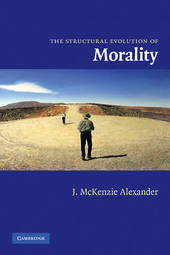
|
The Structural Evolution of Morality
Hardback
Main Details
| Title |
The Structural Evolution of Morality
|
| Authors and Contributors |
By (author) J. McKenzie Alexander
|
| Physical Properties |
| Format:Hardback | | Pages:312 | | Dimensions(mm): Height 229,Width 152 |
|
| Category/Genre | Ethics and moral philosophy |
|---|
| ISBN/Barcode |
9780521870320
|
| Classifications | Dewey:171.7 |
|---|
| Audience | | Professional & Vocational | |
|---|
|
Publishing Details |
| Publisher |
Cambridge University Press
|
| Imprint |
Cambridge University Press
|
| Publication Date |
15 November 2007 |
| Publication Country |
United Kingdom
|
Description
It is certainly the case that morality governs the interactions that take place between individuals. But what if morality exists because of these interactions? This book, first published in 2007, argues for the claim that much of the behaviour we view as 'moral' exists because acting in that way benefits each of us to the greatest extent possible, given the socially structured nature of society. Drawing upon aspects of evolutionary game theory, the theory of bounded rationality, and computational models of social networks, it shows both how moral behaviour can emerge in socially structured environments, and how it can persist even when it is not typically viewed as 'rational' from a traditional economic perspective. This book also provides a theory of how moral principles and the moral sentiments play an indispensable role in effective choice, acting as 'fast and frugal heuristics' in social decision contexts.
Author Biography
J. McKenzie Alexander is Reader in Philosophy in the Department of Philosophy, Logic and Scientific Method at the London School of Economics and Political Science.
Reviews'This is an important book for philosophers as well as social scientists. It clearly models how pro-social behavior can emerge in social networks, and shows which network structures are most conducive to the development of co-operation, trust or fairness. The book advances our understanding of evolutionary games, since it makes them more realistic and applicable to the complex social structures we live in.' Cristina Bicchieri, University of Pennsylvania
|